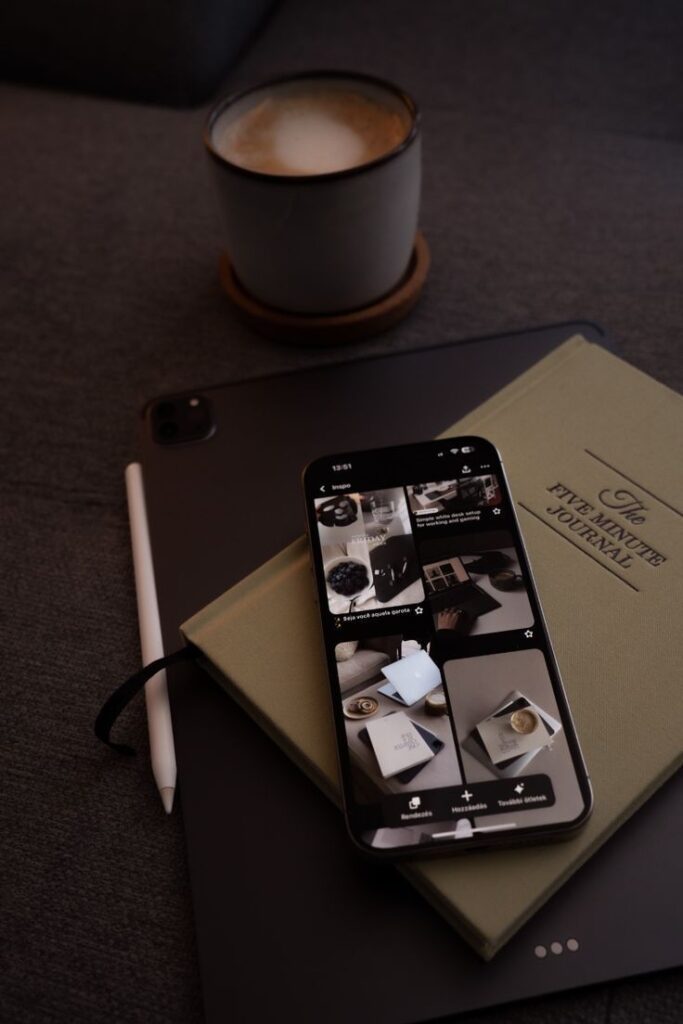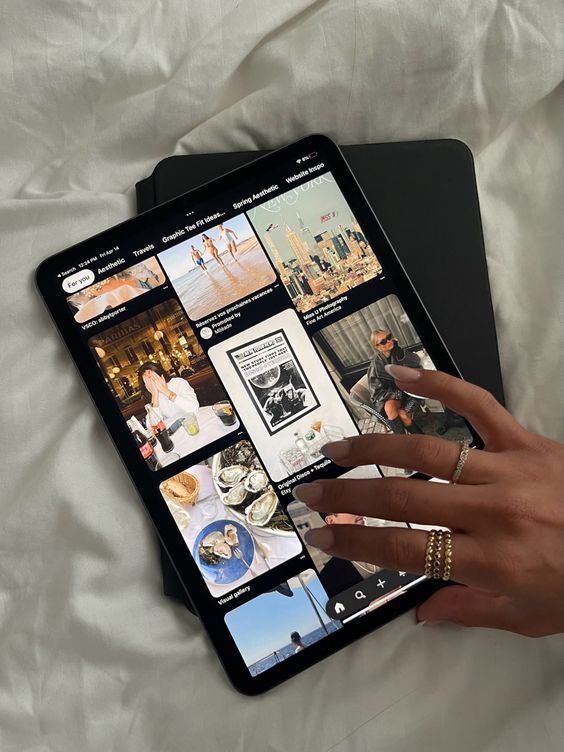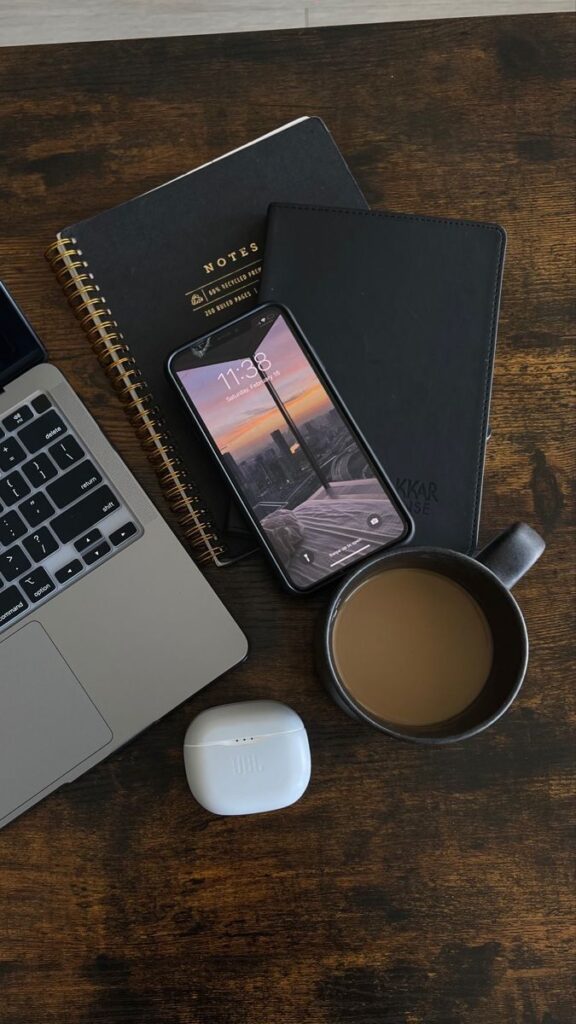Scrolling through social media can sometimes make it feel like everyone else has it all figured out. Photos of perfectly curated lives, major milestones, and exciting adventures can lead you to compare your reality with someone else’s highlight reel. You can stop comparing yourself to others online by focusing on your own journey, setting boundaries with your feed, and practicing gratitude for your achievements.
By becoming more intentional about how you use social platforms and paying attention to your emotional responses, you can break free from the cycle of comparison. Celebrating your own progress and being selective about what you see online helps you create a healthier relationship with social media.



Key Takeaways
- Recognize when and why you compare yourself online
- Use strategies to change your scrolling habits
- Focus on building positive habits both on and offline
Understanding Social Media Comparison
Social media often encourages people to look at the highlight reels of others’ lives. Knowing the ways social comparison works online helps you recognize how easily negative comparisons can shape your feelings and self-view.
The Psychology Behind Social Comparisons
You naturally compare yourself to others to evaluate your own worth and progress. Psychologists call this social comparison theory. Social media amplifies these feelings, as it makes upward comparisons—where you view someone as better off—more frequent and visible.
When you scroll through posts showing success, travel, or celebrations, it can trigger feelings of inadequacy, envy, or even jealousy. These emotional reactions come from seeing only a curated highlight reel, not the full reality of someone’s life.
Recognizing that what you see on social media is selectively shared can help lessen these effects. Most people are not as happy or successful as their profiles might suggest.
Types of Social Media Comparison
There are two main types of social media comparison: upward comparison and downward comparison.
Upward comparison happens when you compare yourself to people you think are better off. This type often leads to negative self-evaluation and increased feelings of low self-worth.
Downward comparison is when you look at others who seem worse off than you. This can lead to a temporary boost in self-esteem, but it’s not always healthy or productive over time.
Both positive and negative comparisons shape how you see yourself. Social media makes these quick and frequent, increasing their impact.
Recognizing the Comparison Trap
The comparison trap is a cycle where you repeatedly measure your life against the curated success or happiness of others online. You might notice feelings of frustration, anger, or sadness after browsing feeds.
Signs you’re caught in a comparison trap include checking profiles obsessively, feeling envious or inadequate, or thinking you’re never doing enough. You may start to devalue your own experiences or accomplishments.
To break free from this pattern, pay attention to your emotional triggers. Make choices about the accounts you follow and the time you spend online to limit negative comparisons.



Negative Impacts of Comparing Yourself Online
When you measure yourself against people online, it can reshape how you feel about your life. This habit often affects your self-esteem, mental health, and perceptions of body and lifestyle.
Effects on Self-Esteem and Confidence
Repeatedly seeing images and stories of others’ achievements, vacations, and seemingly perfect lives can lower your self-esteem. You might start to feel your own successes don’t matter as much, or that you’re somehow failing compared to your peers.
This thinking makes it easy to minimize your unique strengths and qualities. Confidence can drop when you focus only on what others are doing and overlook your own progress.
Comparison can also bring on feelings of insecurity and shame. Social media rarely shows real setbacks or daily struggles, so you might think no one else has flaws. This illusion makes it tough to appreciate your real-world accomplishments.
Mental Health Consequences
Regularly comparing yourself to others online can increase symptoms of anxiety and depression. Research links this habit with lower mood and ongoing stress about not living up to unrealistic standards.
It’s common to experience a sense of guilt or even envy. These emotions often feed into a cycle of negative thinking that further impacts your mental health, making you feel worse with every scroll.
This situation can strain your relationships, too. You may become withdrawn, start doubting your social worth, or feel less connected to friends because you think they’re doing better than you are. This isolation can make it harder to seek support when you need it.
The Role of Body Image and Lifestyle
Social media is filled with carefully filtered photos and curated lifestyles. When you compare your appearance or daily life to these images, negative body image and lifestyle dissatisfaction can follow.
You might begin to believe there is a “right” way to look, behave, or succeed. This thinking can encourage unhealthy comparisons regarding your body or how you spend your time.
Feelings of shame and doubt about your appearance or choices might rise. This can lead to unhealthy habits as you try to match what you see online, further damaging your confidence and well-being.



Identifying Your Personal Triggers
Recognizing what prompts you to start comparing yourself to others can make a big difference in how you respond. Being aware of these triggers is the first step to reducing self-criticism and feelings of inadequacy.
Common Scenarios That Fuel Comparison
Scrolling through curated social media feeds is a frequent spark for comparison. Seeing vacation photos, achievements, or lifestyle highlights often makes you feel left out or behind.
Interactive features like stories, follower counts, or reaction tallies can intensify competitive urges. Comments and likes can quickly become measures of personal value, even if you know they aren’t real indicators of worth.
You may also notice frustration or jealousy after viewing posts from certain people—especially those who share similar goals or interests as you. Recognizing these patterns helps you pinpoint environments that lead to unwanted comparison.
Tip:
Make a simple list of situations, platforms, or accounts that usually leave you feeling worse about yourself. This creates a clear map of your comparison triggers.
Noticing Negative Thoughts and Emotions
Pay attention to internal signals like self-criticism, jealousy, or frustration that arise when scrolling online. Thoughts such as “I should be doing better” or “Why can’t I have that?” are clear red flags of comparison.
If you start to notice tension, anxiety, or sadness after using social media, it’s important to pause and reflect. These reactions are common signs of feeling less than others, which can lead to chronic dissatisfaction.
Try keeping a thought journal for a week—write down any negative emotions or critical thoughts that arise after social media use. Over time, recognizing these patterns can help you catch yourself before you fall into the trap of comparing yourself to others.



Strategies to Stop Comparing Yourself to Others on Social Media
Comparison on social media can undermine your self-worth and affect your mental well-being. Practical steps can help you stay focused on your own growth, strengths, and sense of contentment.
Practicing Mindfulness and Self-Compassion
Mindfulness helps you become aware of your thoughts and how social media influences your emotions. By noticing when you start comparing yourself to others, you can pause and redirect your attention. Regular mindfulness activities, such as deep breathing or short meditations, keep you grounded in the present.
Self-compassion means being kind to yourself when you notice critical thoughts. Instead of judging yourself for feeling behind, remind yourself that everyone has challenges, even if they don’t share them online. You might say to yourself, “It’s okay to feel this way,” or “My journey is unique.” This gentle approach builds self-acceptance and resilience.
A daily self-compassion practice, like journaling three things you appreciate about yourself, can strengthen your sense of self-worth. When you treat yourself with understanding, your emotional reactions to comparison will naturally fade over time.
Building Self-Worth Through Gratitude
Gratitude shifts your focus away from what you lack and toward what you have. Keeping a gratitude journal is a simple way to reinforce the positive aspects of your life. Try listing three things you are grateful for every day, such as supportive friends, personal achievements, or small moments that brought you joy.
Expressing gratitude can also involve appreciating your own traits and abilities, not just external circumstances. For example, you might write, “I am grateful for my patience” or “I value my creativity.” Small acts like this support healthy self-worth and reduce the urge to compare.
Sharing gratitude with others, like sending a thank you message or complimenting someone, can boost both your mood and theirs. Over time, gratitude fosters contentment and helps you see value in your own journey, not just the highlights you see online.
Focusing on Your Progress and Strengths
It’s easy to overlook your own growth when you’re constantly exposed to others’ achievements. Set aside time each week to reflect on your progress and celebrate small wins. This could include tracking your goals, keeping a list of skills you’ve developed, or writing down challenges you’ve overcome.
Use a simple table to monitor your growth:
| Week | Progress Made | New Strengths |
|---|---|---|
| 1 | Finished a new project | Improved time management |
| 2 | Learned a new skill | Built confidence presenting at meetings |
Focusing on your strengths and progress reminds you that personal growth is ongoing. Instead of measuring your worth by others’ standards, you build pride in your unique path. Review your progress regularly to develop more self-acceptance.
Setting Healthy Boundaries Online
Limiting your exposure to triggering content is an important step in protecting your mental well-being. You can mute or unfollow accounts that make you feel inadequate or anxious. Curate your feed to include pages and people who inspire positivity and self-growth.
Consider scheduling specific times to check social media rather than scrolling throughout the day. This helps prevent mindless use and gives you space to focus on your own priorities. Some people also benefit from taking regular digital detoxes, such as a weekend off from social media apps.
Talk openly with friends about your boundaries if you need support. Healthy boundaries allow you to enjoy online interactions without constantly comparing yourself to others, supporting your sense of self-worth and overall contentment.
Cultivating Positive Habits for Lasting Change
Building healthy routines can shift your mindset, support your resilience, and help you experience more joy and motivation in everyday life. By making these habits a regular part of your life, you can reduce the desire to compare yourself to what you see online and find more satisfaction in your own journey.
Keeping a Gratitude Journal
A gratitude journal is a simple but effective tool for improving happiness and building resilience against negative self-comparisons. Each day, write down three things you’re grateful for. These can be small moments, acts of kindness, or anything that brought you joy.
Creating a daily record of gratitude redirects your focus from what’s missing to what’s already abundant in your life. Over time, you train your brain to notice positive experiences first rather than always measuring against others. Try to include details and specific reasons why you appreciate these things to make the benefits stronger.
Some people prefer to use lists, while others write a few sentences for each entry. Either way, keeping a regular log of gratitude reminds you of your progress and can lessen the impact of discouraging social media content.
Incorporating Self-Care and Exercise
Self-care and physical activity are essential for personal development and well-being. Regular exercise boosts your mood and lowers stress, giving you a stronger foundation to resist negative thoughts or jealousy triggered by social media.
Consider making a short daily routine using activities like brisk walking, stretching, or yoga. These physical practices improve both your mental and physical resilience. Pair exercise with other self-care habits such as getting enough sleep, drinking water, and practicing positive affirmations.
A self-care checklist might look like:
| Self-Care Activities | Frequency |
|---|---|
| 20-minute walk | Daily |
| Deep breathing | Twice/day |
| Digital detox | 1 hour/day |
| Mindful eating | Each meal |
These steady habits help you reconnect with your own body and mind, rather than comparing them to curated online images.
Harnessing Inspiration for Personal Development
Instead of letting others’ posts on social media trigger self-doubt, use them as opportunities for inspiration and self-improvement. When you see achievements or creativity online, ask yourself how you can learn from or be motivated by them.
Create a folder or mood board of posts, quotes, and images that genuinely inspire you, rather than those that make you feel less than. Use these for motivation during goal-setting or when you need a boost in confidence.
Being part of a positive community, such as forums, group chats, or local activity groups, can also strengthen your sense of belonging. Engaging with supportive peers keeps you focused on growth rather than competition, fostering lasting happiness and personal development.
Becoming the Best Version of Yourself Offline and Online
Building your best self means recognizing your strengths and pursuing growth, both online and in daily life. This process is closely connected to how you see your journey and who you surround yourself with.
Celebrating Your Unique Journey
You have your own background, goals, and experiences. Comparing your lifestyle or success to the filtered lives you see on social media often leads to toxic comparisons rather than progress.
Celebrate each step you take—even small achievements matter. Try keeping a journal to track your growth. Writing down what you’ve accomplished helps shift your attention away from what others are doing.
Instead of measuring your worth by external standards, focus on personal growth. Make a list of the skills or habits you want to develop, and set realistic goals for each one. Your story is unique, and recognizing that reduces the pressure to “keep up” with anyone else.
Nurturing Healthy Relationships and Connections
Choose to interact with people who support and inspire you. Strong relationships play a key role in your well-being and encourage you to become the best version of yourself.
Spend time offline with friends, family, or communities that value authenticity. Schedule regular activities where social media is not the focus, like shared meals, walks, or creative hobbies. These moments strengthen genuine connections and help you feel grounded.
If certain online spaces or accounts make you feel less about yourself, consider unfollowing or muting them. Curate your online experience to include positive influences that align with your values and personal growth. Your relationships, both offline and online, should help you thrive—not feed self-doubt.





